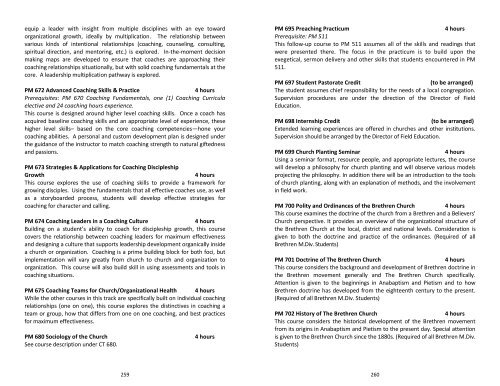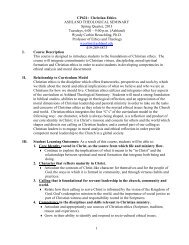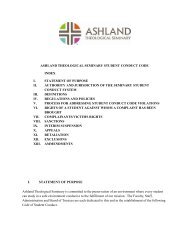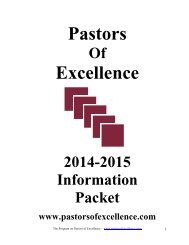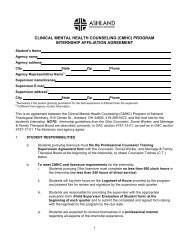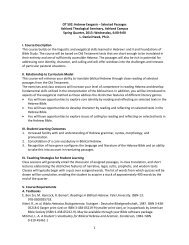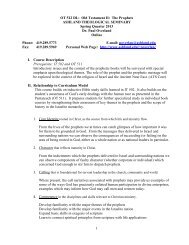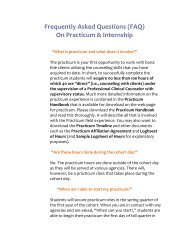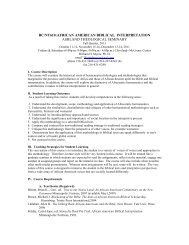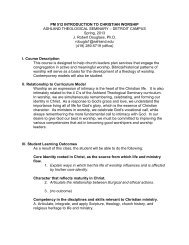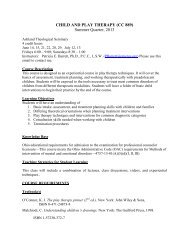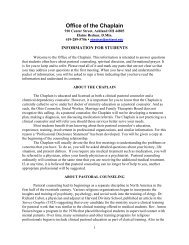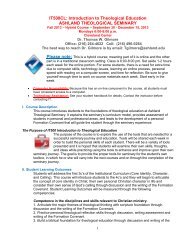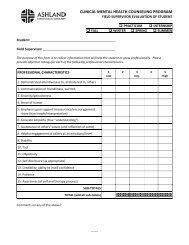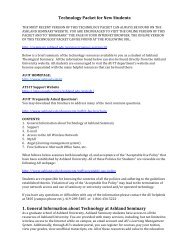Download - Ashland Theological Seminary - Ashland University
Download - Ashland Theological Seminary - Ashland University
Download - Ashland Theological Seminary - Ashland University
Create successful ePaper yourself
Turn your PDF publications into a flip-book with our unique Google optimized e-Paper software.
equip a leader with insight from multiple disciplines with an eye toward<br />
organizational growth, ideally by multiplication. The relationship between<br />
various kinds of intentional relationships (coaching, counseling, consulting,<br />
spiritual direction, and mentoring, etc.) is explored. In-the-moment decision<br />
making maps are developed to ensure that coaches are approaching their<br />
coaching relationships situationally, but with solid coaching fundamentals at the<br />
core. A leadership multiplication pathway is explored.<br />
PM 672 Advanced Coaching Skills & Practice<br />
4 hours<br />
Prerequisites: PM 670 Coaching Fundamentals, one (1) Coaching Curricula<br />
elective and 24 coaching hours experience.<br />
This course is designed around higher level coaching skills. Once a coach has<br />
acquired baseline coaching skills and an appropriate level of experience, these<br />
higher level skills– based on the core coaching competencies—hone your<br />
coaching abilities. A personal and custom development plan is designed under<br />
the guidance of the instructor to match coaching strength to natural giftedness<br />
and passions.<br />
PM 673 Strategies & Applications for Coaching Discipleship<br />
Growth<br />
4 hours<br />
This course explores the use of coaching skills to provide a framework for<br />
growing disciples. Using the fundamentals that all effective coaches use, as well<br />
as a storyboarded process, students will develop effective strategies for<br />
coaching for character and calling.<br />
PM 674 Coaching Leaders in a Coaching Culture<br />
4 hours<br />
Building on a student’s ability to coach for discipleship growth, this course<br />
covers the relationship between coaching leaders for maximum effectiveness<br />
and designing a culture that supports leadership development organically inside<br />
a church or organization. Coaching is a prime building block for both foci, but<br />
implementation will vary greatly from church to church and organization to<br />
organization. This course will also build skill in using assessments and tools in<br />
coaching situations.<br />
PM 675 Coaching Teams for Church/Organizational Health 4 hours<br />
While the other courses in this track are specifically built on individual coaching<br />
relationships (one on one), this course explores the distinctives in coaching a<br />
team or group, how that differs from one on one coaching, and best practices<br />
for maximum effectiveness.<br />
PM 680 Sociology of the Church<br />
See course description under CT 680.<br />
4 hours<br />
PM 695 Preaching Practicum<br />
4 hours<br />
Prerequisite: PM 511<br />
This follow-up course to PM 511 assumes all of the skills and readings that<br />
were presented there. The focus in the practicum is to build upon the<br />
exegetical, sermon delivery and other skills that students encountered in PM<br />
511.<br />
PM 697 Student Pastorate Credit<br />
(to be arranged)<br />
The student assumes chief responsibility for the needs of a local congregation.<br />
Supervision procedures are under the direction of the Director of Field<br />
Education.<br />
PM 698 Internship Credit<br />
(to be arranged)<br />
Extended learning experiences are offered in churches and other institutions.<br />
Supervision should be arranged by the Director of Field Education.<br />
PM 699 Church Planting Seminar<br />
4 hours<br />
Using a seminar format, resource people, and appropriate lectures, the course<br />
will develop a philosophy for church planting and will observe various models<br />
projecting the philosophy. In addition there will be an introduction to the tools<br />
of church planting, along with an explanation of methods, and the involvement<br />
in field work.<br />
PM 700 Polity and Ordinances of the Brethren Church<br />
4 hours<br />
This course examines the doctrine of the church from a Brethren and a Believers’<br />
Church perspective. It provides an overview of the organizational structure of<br />
the Brethren Church at the local, district and national levels. Consideration is<br />
given to both the doctrine and practice of the ordinances. (Required of all<br />
Brethren M.Div. Students)<br />
PM 701 Doctrine of The Brethren Church<br />
4 hours<br />
This course considers the background and development of Brethren doctrine in<br />
the Brethren movement generally and The Brethren Church specifically.<br />
Attention is given to the beginnings in Anabaptism and Pietism and to how<br />
Brethren doctrine has developed from the eighteenth century to the present.<br />
(Required of all Brethren M.Div. Students)<br />
PM 702 History of The Brethren Church<br />
4 hours<br />
This course considers the historical development of the Brethren movement<br />
from its origins in Anabaptism and Pietism to the present day. Special attention<br />
is given to the Brethren Church since the 1880s. (Required of all Brethren M.Div.<br />
Students)<br />
259<br />
260


